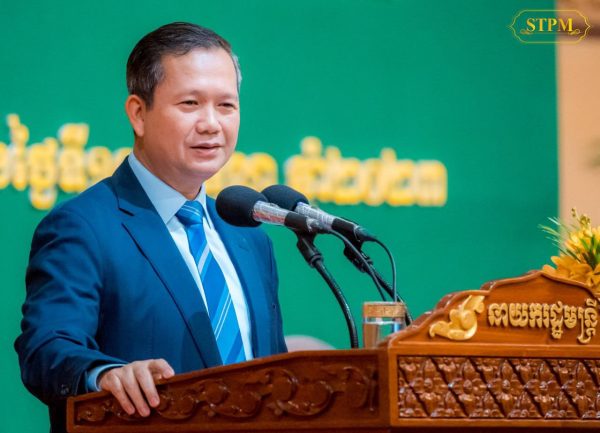By Gordon Conochie,Sue Coffey
Copyright thediplomat

It has now been just over two years since Hun Manet assumed the role of prime minister of Cambodia in August 2023. The son of former Prime Minister Hun Sen, Manet’s accession continued the near 40-year rule of the Hun family in one of the least developed nations in Southeast Asia. In the two-year period of Manet’s rule, any hope that Hun Sen’s Western-educated son would bring positive change has been dashed. The country was deprived by repressive government actions of a viable opposition in both the 2018 and 2023 elections, and Hun Manet continues his father’s role as effective dictator. With Hun Sen now serving as head of the Senate, and no separation of powers to speak of, the state capture by the ruling Cambodian People’s Party (CPP) is now complete. Hun Manet’s two years in power have witnessed a decline in any semblance of a government functioning in the interests of its people. By international benchmarks, Cambodia fails dismally in terms of corruption, rule of law, and alleviation of poverty. It was one of four South-East Asian nations on the U.N. list of least developed countries in 2024, 158th of 180 countries in Transparency International’s 2024 Corruption Perceptions Index, and 141st out of 142 countries in the World Justice Project’s 2024 Rule of Law Index. These positions have been mostly unchanged for years. Under Hun Manet’s rule, political repression and incarcerations have increased, with dozens of political opponents now behind bars and more being arrested each month. The government harasses and arrests labor unionists, environmentalists, and land activists. Meanwhile, the Cambodian state continues to evict communities and hand their land to wealthy elites, in the process diminishing the country’s forests and threatening its biodiversity hotspots. Years of underinvestment by the government in viable industries has led to a lack of jobs for Cambodians outside the country’s garment sector, and Cambodia has one of the region’s highest rates of external migration for low- and medium-skilled jobs. Despite Cambodia’s aspirations to become a middle-income country, new U.S. tariffs and slowing foreign investment will hamper economic growth. Following the recent Cambodia-Thailand border conflict, upwards of a million Cambodian workers have returned from Thailand, and are now facing the prospect of prolonged unemployment and limited state support. Hun Manet took advantage of the conflict to amend Cambodia’s Citizenship Law to allow the government to silence dissent. The amended law allows the government to strip Cambodians of their citizenship if convicted by the CPP-controlled courts of treason or “collusion with foreign powers.” Human rights organizations have condemned the amendment, among them Amnesty International, which says it is “deeply concerned that the Cambodian Government, given the power to strip people of their citizenship, will misuse it to crackdown on its critics and make them stateless.” At the forefront of Hun Manet’s failure to govern responsibly is the huge and growing issue of international cybercrime, fueled by human trafficking and forced labor. Recent reports by Amnesty International and by Jacob Sims, an expert on online scamming operations who was forced to relocate from the country for refusing to stay silent about the government’s complicity in the industry, have laid bare the extent of this state-abetted crime. The cybercrime economy is estimated to generate $12 to $19 billion annually, an amount totaling half the country’s GDP. At least 350 scam compounds are operating in Cambodia with some 150,000 foreign workers; with some estimating the number to be higher. According to Sims, the Cambodian government has become a globally damaging mafia state (Cambodia’s government has denied any involvement in online scamming operations.) While other countries in the region have shown increasing determination to crack down on the scam industry, Cambodia’s efforts have been cosmetic, with no attention to compounds known to be associated with government figures or prominent businesspeople. In July, the Thai authorities issued an arrest warrant for Kok An, a CPP senator and close adviser to Hun Sen, alleging his involvement in illegal businesses including cyberscam operations. His properties, including those on the Cambodian-Thai border, were raided and millions of dollars of assets seized. Thailand’s clear determination to combat cybercrime is thought to have contributed to the recent border dispute. The period of the border dispute highlighted the extent to which Hun Sen still runs the show: it was he who engaged with the Thai prime minister and led the Cambodian response to the conflict that broke out in late July. The father still dominates both Hun Manet and Cambodia. Several Asian countries, including Thailand, Japan, South Korea, Vietnam and Indonesia now work through ASEAN channels to combat cybercrime; Cambodia and Myanmar, both hubs for cybercrime in Southeast Asia, are not among them. The picture of exploitation and crime is ever harder to expose, as free media in Cambodia has been destroyed or cowed into silence. Voice of Democracy and Radio Free Asia were forced to close operations in Cambodia in recent years, following The Cambodia Daily’s forced closure in 2017. The activities of these outlets, now based in the United States, have been severely curtailed by loss of funding – to the great satisfaction of the Cambodian government. Local journalists who still operate in the country are regularly arrested and foreign journalists have been refused entry to the country. Cambodia’s next commune elections are scheduled for 2027, and its national election for 2028. By then Hun Manet will have been in power for five years. Will there be any chance for democratic change, with a new and viable opposition able to contest the election? While Cambodians must have hope, the outlook is not good. In 2017, the opposition Cambodia National Rescue Party (CNRP) was abolished when it became clear that it could win the election in 2018, and its leader Kem Sokha was sentenced to 27 years in prison for “treason,” which he is currently serving under house arrest. In 2023, the CNRP’s successor, the Candlelight Party, was arbitrarily excluded from the election. Yet many Cambodians still hope that another party will emerge to contest the election in 2028. That hope can be bolstered by the international community’s clear censure of the Cambodian government. The United States, Canada, and the United Kingdom have already enacted financial sanctions against senior Cambodian figures over their role in cyberscams, human trafficking, and democratic decline. Australia, a regular and vocal critic of human rights abuses in Cambodia, has not followed with its own substantive action through sanctions. Australia should apply Magnitsky-style sanctions against many Cambodian ruling party figures and tycoons. It is important that Australia broaden its support for human rights in Cambodia. Steps to do so could include allocating more funds directly to Cambodian human rights NGOs, many of which are under desperate financial strain following the loss of USAID funding; denying visas to senior Cambodian government officials visiting Australia to threaten diaspora members; taking sanctions against Cambodian ruling party figures over their involvement in the cyberscam industry, which counts Australians among its victims; and offering more asylum places to political refugees from Cambodia. Cambodia has suffered a tragic past under the Khmer Rouge and now a repressive dictatorship, and yet its people keep the hope for democracy alive in their hearts and actions. They deserve our help. In October, it will be 34 years since the signing of the Paris Peace Agreements, in which Australia played a major role, which promised democracy for Cambodia. Actions speak louder than words; when Australia says it is committed to democracy and human rights in our region, it must be willing to act accordingly.



